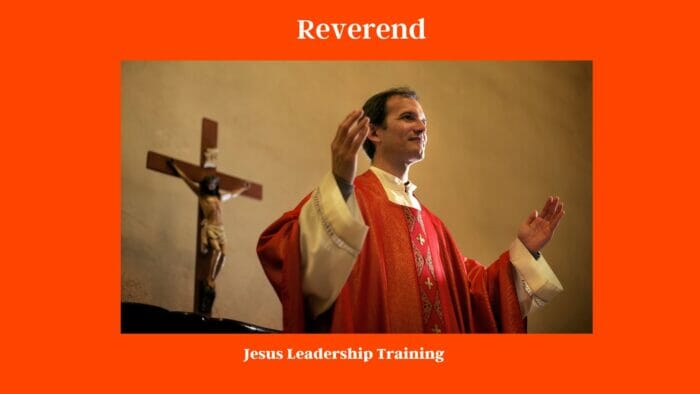Table of Contents
What is a Reverend in the Bible
Reverend in the Bible – In this comprehensive article, we will explore the term “Reverend” from various perspectives, shedding light on its biblical definition, religious affiliations, roles, and even the controversial aspects related to marriage within certain religious contexts. So, let’s delve into the world of the Reverend and unravel the mysteries behind this esteemed title.
Biblical Definition of a Reverend
The term “Reverend” carries profound significance within the religious domain, particularly in Christianity. Let’s explore its biblical definition, the individuals eligible to be called Reverend, and some intriguing insights from the Holy Scriptures.
Who Can be Called Reverend
The title “Reverend” is usually bestowed upon ordained ministers, pastors, or priests within the Christian faith. These individuals have undergone specific religious training and possess the authority to lead worship services, deliver sermons, and administer sacraments.
How Many Times is “Reverend” Used in the Bible
Interestingly, the word “Reverend” appears only once in the Bible. It is found in Psalms 111:9 (KJV), which states, “He sent redemption unto his people: he hath commanded his covenant forever: holy and reverend is his name.” Here, the term is used to refer to God’s name as holy and worthy of reverence.

Call no Man Reverend in the Bible
While the title “Reverend” is used to honor God, there is an intriguing scriptural verse cautioning against calling any man “Reverend.” This thought-provoking verse can be found in Matthew 23:9 (KJV), where Jesus says, “And call no man your father upon the earth: for one is your Father, which is in heaven.”
Is Reverend Catholic or Protestant
The title “Reverend” is not confined to a single religious denomination. It is widely used across various Christian branches. Let’s explore its significance in both Catholic and Protestant contexts.

What Religion is a Reverend
The term “Reverend” is commonly associated with Christian denominations, including both Catholic and Protestant churches. It serves as an honorific for ordained clergy members, signifying their sacred roles within the faith.
Reverend Vs Father in the Catholic Church
In the Catholic Church, the title “Reverend” is often used to address ordained priests. On the other hand, the title “Father” is also used to address priests, emphasizing their spiritual role as spiritual fathers, guiding and nurturing their congregations.
Reverend Vs Pastor
While both “Reverend” and “Pastor” signify religious leadership, they are not entirely interchangeable. “Reverend” is a title used to address clergy members, whereas “Pastor” is a descriptive term for someone who leads and shepherds a congregation.
What is a Reverend in the Catholic Church
In the Catholic Church, the title “Reverend” carries specific qualifications, and those who hold it play significant roles within the Church hierarchy. Let’s explore what it takes to become a Reverend in the Catholic Church.
Qualifications
To become a Reverend in the Catholic Church, individuals must go through a rigorous process of education, formation, and ordination. They typically attend seminary to receive theological training and spiritual guidance before being ordained as priests.
Training
During their time in the seminary, aspiring Reverends undergo comprehensive training in theology, liturgy, pastoral care, and canon law. This equips them with the knowledge and skills necessary to fulfill their pastoral duties effectively.
Appointments
Once ordained, Reverends may be appointed to serve in various capacities within the Catholic Church. They could become parish priests, chaplains, or even serve in administrative roles within the diocese.

What Does a Reverend Do
Reverends play essential roles within their respective Christian communities. Let’s explore the diverse responsibilities they undertake in their ministerial journey.
Sermons
One of the primary responsibilities of a Reverend is to deliver sermons during worship services. These sermons aim to inspire, educate, and provide spiritual guidance to the congregation.
Counsel
Reverends often act as spiritual counselors, offering support and guidance to individuals facing challenges or seeking advice on matters of faith and life.
Confession
In some Christian traditions, Reverends are responsible for hearing confessions and granting absolution to penitent individuals.
Events
Reverends frequently officiate various religious ceremonies, such as weddings, funerals, and other significant events in the lives of their congregation members.
Baptisms
Reverends administer the sacrament of baptism, welcoming new members into the Christian community.
Deaths
During times of grief, Reverends provide comfort and perform funeral rites, helping families navigate through the process of mourning.
Can a Reverend Marry
The question of whether a Reverend can marry depends on the specific Christian denomination and its rules regarding the marital status of clergy members. Let’s explore this topic in detail.
Can Orthodox Priests Marry
In some Christian traditions, such as Eastern Orthodox Christianity, priests are allowed to marry before their ordination. However, they cannot marry after becoming priests, following the practice of early Christian tradition.
Can a Retired Catholic Priest Get Married
In the Roman Catholic Church, priests are expected to remain celibate, and marriage is not permitted for ordained clergy members. However, in certain cases, when a Catholic priest decides to leave the priesthood, they may be allowed to marry.
When Did the Catholic Church Stop Allowing Priests to Marry
The requirement of celibacy for Catholic priests was gradually established over centuries. By the 12th century, celibacy became more strictly enforced, and the Second Lateran Council in 1139 officially prohibited priests from marrying.
- FAQ: What does the term “Reverend” mean in the Bible? Answer: In the Bible, the term “Reverend” is used only once in Psalms 111:9 (KJV) to describe God’s name as holy and worthy of reverence.
- FAQ: Can individuals other than God be called “Reverend” according to the Bible? Answer: While the title “Reverend” is attributed to God’s name, the Bible cautions against calling any man “Reverend” in Matthew 23:9 (KJV), emphasizing reverence for God alone.
- FAQ: How many times is the word “Reverend” mentioned in the Bible? Answer: The word “Reverend” appears only once in the Bible, in Psalms 111:9 (KJV).
- FAQ: Who is eligible to be called “Reverend” according to biblical principles? Answer: The title “Reverend” is often used to address ordained ministers, pastors, or priests within the Christian faith who have undergone specific religious training and serve in leadership roles.
- FAQ: Does the title “Reverend” have a specific religious affiliation within Christianity? Answer: The title “Reverend” is not limited to a particular denomination but is widely used across various Christian branches to honor ordained clergy members.
- FAQ: Is the term “Reverend” used in both Catholic and Protestant churches? Answer: Yes, both Catholic and Protestant churches use the title “Reverend” to address ordained clergy members in recognition of their sacred roles.
- FAQ: What is the distinction between “Reverend” and “Father” in the Catholic Church? Answer: In the Catholic Church, “Reverend” is used to address ordained priests, while “Father” is also employed as a term of endearment, signifying their spiritual role as fathers to their congregations.
- FAQ: How does the role of a “Reverend” differ from that of a “Pastor”? Answer: “Reverend” is a title used to address clergy members, while “Pastor” is a descriptive term for someone who leads and shepherds a congregation.
- FAQ: What are the qualifications required to become a “Reverend” in the Catholic Church? Answer: To become a “Reverend” in the Catholic Church, individuals typically undergo rigorous education, formation, and ordination, often attending seminary for theological training.
- FAQ: Can Reverends marry according to biblical teachings? Answer: The permissibility of marriage for Reverends varies among Christian denominations. In some traditions, such as Eastern Orthodox Christianity, priests can marry before ordination, while celibacy is typically expected after ordination in the Catholic Church.
Reverend Meaning in the Bible
The title “Reverend” is not explicitly found in the Bible in the way that it is used today to refer to Christian ministers or clergy. However, the concept of reverence, respect, and authority for spiritual leaders can be traced through biblical texts and later Christian tradition. Here’s a table outlining how the term might be linked to biblical texts and subsequent traditions:
| Period/Source | Description | Relevant Texts/Traditions |
|---|---|---|
| Old Testament | In the Hebrew Bible, spiritual leaders like priests and prophets were held in high esteem but were not referred to as “Reverend.” They were, however, to be respected and listened to by the community. | Leviticus 21, Deuteronomy 18:15-22 |
| New Testament | Apostles and elders are shown as figures of authority in the church. The term “Reverend” is not used, but leaders are to be honored and obeyed according to the teachings of the apostles. | Hebrews 13:17, 1 Timothy 5:17, Acts 15 |
| Early Church Tradition | The leaders of the early Christian communities, such as bishops, were honored but not usually referred to as “Reverend.” However, they were considered successors to the apostles and therefore worthy of respect. | Church Fathers’ writings, early creeds |
| Medieval Period | The term “Reverend” began to be used more widely as the institutional church took shape. It was employed to show respect and authority for clergy. | Church documents, Councils |
| Reformation | Reformers like Martin Luther questioned the titles and hierarchy of the church but still held that ministers of the word should be respected. | Writings of the Reformers |
| Modern Usage | The term “Reverend” is commonly used today across many denominations to refer to ordained ministers or priests. It signifies a role of spiritual leadership within a faith community. | Modern denominational handbooks, ordination practices |
It’s important to note that the title “Reverend” itself, as used today, is more a product of church tradition than direct biblical teaching. However, the underlying concepts of respect, authority, and spiritual leadership can be traced through both the Old and New Testaments
Final Thoughts
Throughout this extensive exploration of the term “Reverend,” we have learned that it holds deep biblical significance, serving as a title of reverence for God’s name. It transcends denominational boundaries, being used both in Catholic and Protestant contexts to address ordained clergy members who play vital roles within their respective Christian communities. Moreover, we have seen that while some Christian traditions permit married clergy members, celibacy remains a longstanding tradition within the Catholic Church.
With their theological education, pastoral care, and spiritual leadership, Reverends hold an essential place within Christianity, guiding and supporting their congregations in their spiritual journeys. So, whether you find yourself sitting in a church pew, seeking spiritual counsel, or witnessing significant life events, you can rest assured that a Reverend will be there, faithfully fulfilling their sacred calling.
Best Bible Encyclopedias and Dictionaries
Below is a table featuring some highly regarded Bible Encyclopedias and Dictionaries along with their publishers and websites where they can be found or purchased.
| Title | Publisher | Website |
|---|---|---|
| The International Standard Bible Encyclopedia | Eerdmans | Eerdmans |
| Zondervan’s Pictorial Bible Dictionary | Zondervan | Zondervan |
| Easton’s Bible Dictionary | Thomas Nelson | Thomas Nelson |
| Holman Illustrated Bible Dictionary | B&H Publishing Group | B&H Publishing Group |
| The New Unger’s Bible Dictionary | Moody Publishers | Moody Publishers |
| HarperCollins Bible Dictionary | HarperOne | HarperOne |
| Vine’s Complete Expository Dictionary of Old and New Testament Words | Thomas Nelson | Thomas Nelson |
You can generally find these resources on the publishers’ websites, as well as other online book retailers such as Amazon or Christianbook. It’s always good practice to confirm availability and review additional details on the specific websites or other reliable online bookstores.




